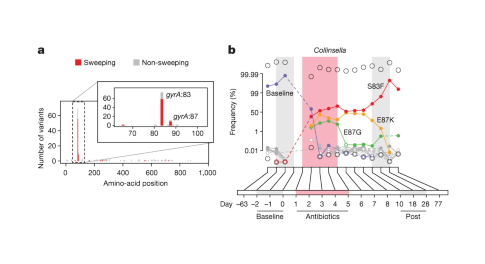## The AI Ghostwriters: Science Undermines Itself
For centuries, the cornerstone of scientific progress has been transparency. Researchers meticulously document their methods, share data, and allow others to scrutinize their work, ensuring the integrity of the pursuit of knowledge. But what happens when this bedrock of trust is shaken? What if the very foundation of scientific discovery is built on secrets?

A recent bombshell report from Nature reveals a troubling trend: hundreds of scientific papers might have been ghostwritten by artificial intelligence, with authors failing to disclose this crucial detail.
This isn’t just a technicality. This is a potential crisis for the scientific community, one that could erode public trust and jeopardize years of painstaking research. Join us as we delve into this alarming story, exploring the implications of AI-generated science and the urgent need for greater transparency in the pursuit of knowledge.The Responsibility of Reviewers and Editors in Detecting AI Use
In the age of artificial intelligence (AI), the responsibility of reviewers and editors in detecting AI use has never been more crucial. As researchers increasingly rely on AI tools to prepare and review manuscripts, it is essential that publishers and academic institutions establish clear guidelines and protocols for the use of AI in research and publishing. The recent discovery of hundreds of papers that used AI without disclosing it has raised concerns about the integrity of scientific research and the need for greater transparency and accountability.
According to a study by Alex Glynn, a research literacy and communications instructor at the University of Louisville in Kentucky, hundreds of papers have been flagged for undisclosed AI use. Glynn created an online tracker, Academ-AI, to log these cases, and has more than 700 papers listed. In an analysis of the first 500 papers flagged, released as a preprint in November, Glynn found that 13% of these articles appeared in journals belonging to large publishers, such as Elsevier, Springer Nature, and MDPI.
Challenges in Identifying AI-Generated Text and Subtle Signs
One of the significant challenges in detecting AI use is identifying subtle signs that may indicate AI-generated text. While some AI tools leave obvious signs, such as the phrase “I am an AI language model,” others may use more subtle language that can be easily missed by reviewers and editors. Glynn notes that some chatbots based on large language models may use phrases like “regenerate response” or “Certainly, here are,” which can be indicative of AI use.
Artur Strzelecki, a researcher at the University of Economics in Katowice, Poland, has also identified subtle signs of AI use in papers. In a study published in December, he identified 64 papers that were published in journals categorized by the Scopus academic database as being in the top quartile for their field. Strzelecki notes that these journals are expected to have good work from editors and decent reviews, making the detection of AI use even more challenging.
The Importance of Rigorous Peer Review and Disclosure Practices
Rigorous peer review and disclosure practices are essential in maintaining the integrity of scientific research. Reviewers and editors must be vigilant in detecting AI use and ensuring that authors disclose the use of AI tools in the preparation of their papers. Publishers must also establish clear guidelines and protocols for the use of AI in research and publishing.
Kim Eggleton, head of peer review and research integrity at IOP Publishing in Bristol, UK, notes that while some publishers may not require disclosure of AI use, it is essential to ensure that authors are transparent about their methods. Eggleton adds that IOP Publishing has established clear guidelines for AI use and requires authors to disclose any AI-assisted copy editing.
The Future of Academic Publishing in the Age of AI
The use of AI in academic publishing is transforming the way research is conducted and published. While AI tools can enhance the quality and efficiency of research, they also raise concerns about the integrity and transparency of scientific research. As AI use becomes more widespread, it is essential that publishers and academic institutions establish clear guidelines and protocols for the use of AI in research and publishing.
The Potential Benefits and Drawbacks of AI-Assisted Publishing
AI-assisted publishing has the potential to enhance the quality and efficiency of research. AI tools can help authors prepare manuscripts, review papers, and even correct grammatical errors. However, the use of AI also raises concerns about the integrity and transparency of scientific research. Authors may use AI tools without disclosing their use, which can compromise the validity of research findings.
Strzelecki notes that AI tools can also perpetuate biases and errors if not properly trained or used. “AI tools can be just as biased as humans if they are trained on biased data or used in a biased manner,” Strzelecki says. “This can have serious consequences for the validity and reliability of research findings.”
The Need for Ongoing Research and Development of AI Tools and Policies
Ongoing research and development of AI tools and policies are essential in maintaining the integrity and transparency of scientific research. Publishers and academic institutions must establish clear guidelines and protocols for the use of AI in research and publishing, and AI developers must continue to improve the accuracy and reliability of their tools.
Glynn notes that researchers must also be aware of the potential risks and limitations of AI use. “Researchers must be aware of the potential biases and errors of AI tools and take steps to mitigate them,” Glynn says. “This includes using multiple AI tools, checking results for accuracy, and being transparent about AI use.”
Implications and Practical Aspects
Scientific Integrity and the Public Trust
The use of AI in research and publishing has significant implications for scientific integrity and the public trust. If authors use AI tools without disclosing their use, it can compromise the validity and reliability of research findings, undermining public trust in science.
Strzelecki notes that the use of AI can also perpetuate biases and errors if not properly trained or used. “AI tools can be just as biased as humans if they are trained on biased data or used in a biased manner,” Strzelecki says. “This can have serious consequences for the validity and reliability of research findings.”
The Ethics of AI-Assisted Publishing
The ethics of AI-assisted publishing are complex and multifaceted. While AI tools can enhance the quality and efficiency of research, they also raise concerns about the integrity and transparency of scientific research. Authors, reviewers, and editors must be aware of the potential risks and limitations of AI use and take steps to mitigate them.
Glynn notes that researchers must be transparent about AI use and ensure that AI tools are used in a way that maintains the integrity and validity of research findings. “Researchers must be aware of the potential biases and errors of AI tools and take steps to mitigate them,” Glynn says. “This includes using multiple AI tools, checking results for accuracy, and being transparent about AI use.”
Navigating the Changing Landscape of Academic Publishing
Navigating the changing landscape of academic publishing requires ongoing dialogue and collaboration between stakeholders. Publishers, researchers, and academic institutions must work together to establish clear guidelines and protocols for the use of AI in research and publishing.
Strategies for Researchers and Publishers to Adapt to AI Advancements
Researchers and publishers must adapt to AI advancements by establishing clear guidelines and protocols for the use of AI in research and publishing. This includes using AI tools in a way that maintains the integrity and validity of research findings, being transparent about AI use, and ensuring that AI tools are used in a way that does not perpetuate biases and errors.
Eggleton notes that IOP Publishing has established clear guidelines for AI use and requires authors to disclose any AI-assisted copy editing. “IOP Publishing has a clear policy on AI use and requires authors to disclose any AI-assisted copy editing,” Eggleton says. “This helps to ensure that authors are transparent about their methods and that AI tools are used in a way that maintains the integrity and validity of research findings.”
Conclusion
The Unseen Footprint of AI in Scientific Research: A Wake-Up Call for Transparency
A recent investigation by Nature has shed light on a pressing concern in the scientific community: the ubiquitous use of artificial intelligence (AI) without proper disclosure in research papers. Science sleuths have flagged hundreds of studies that utilize AI methods, yet fail to acknowledge this critical detail. This oversight not only undermines the integrity of research but also raises questions about the reliability and validity of findings. The study highlights the widespread adoption of AI in various fields, from medicine to environmental science, where AI-generated data and analysis are increasingly common.
The implications of this lack of transparency are far-reaching and significant. Without clear disclosure, researchers, policymakers, and the public may be misled about the accuracy and implications of AI-driven research. This could lead to misinformed decisions, wasted resources, and even harm to individuals or the environment. Moreover, the unethical use of AI-generated data without proper attribution can compromise the trust and credibility of the scientific community. As AI continues to transform research, it is essential that scientists, journals, and institutions prioritize transparency and accountability in the use of AI methods.
As we move forward, it is imperative that the scientific community adopts clear guidelines and standards for AI disclosure. Researchers must acknowledge the role of AI in their work, and journals should enforce robust policies for detecting and addressing AI-generated content. By doing so, we can maintain the trust and integrity of scientific research, ensuring that the benefits of AI are harnessed while minimizing its risks. As we stand at the threshold of a new era in scientific inquiry, one thing is clear: the future of AI in research depends on our ability to confront the challenges of transparency and accountability head-on. The question is, will we rise to the challenge?
